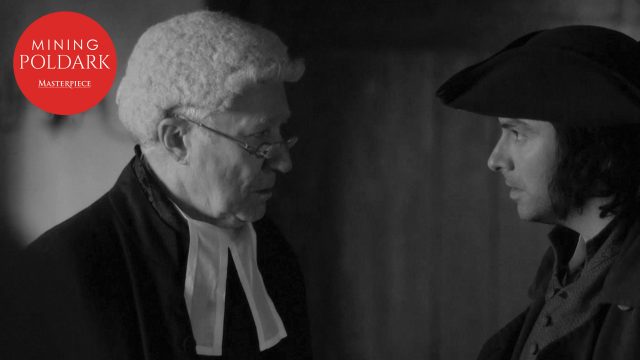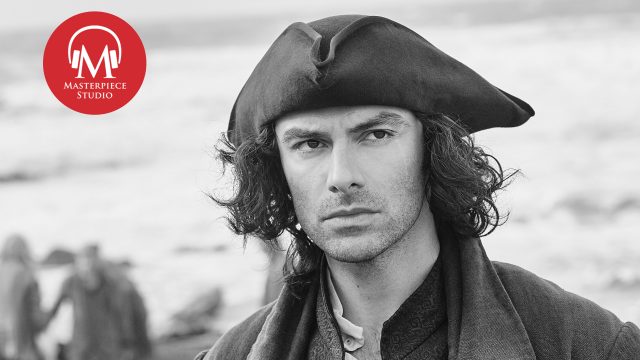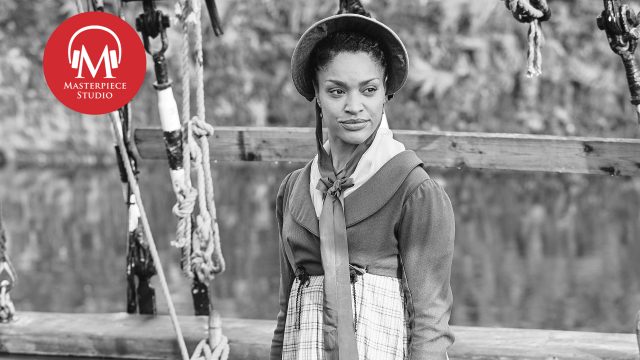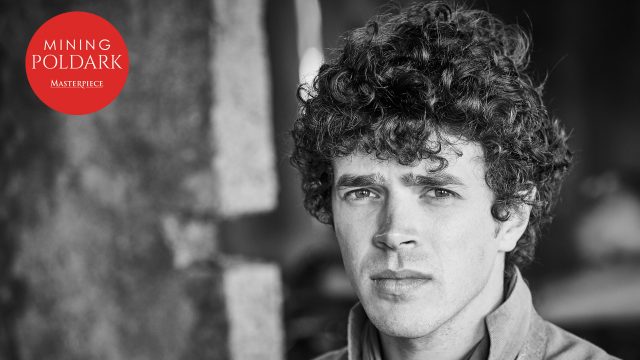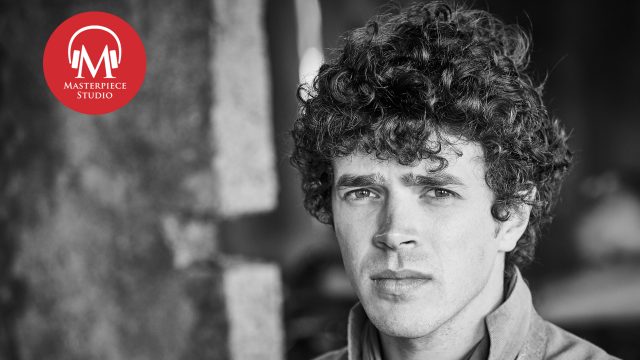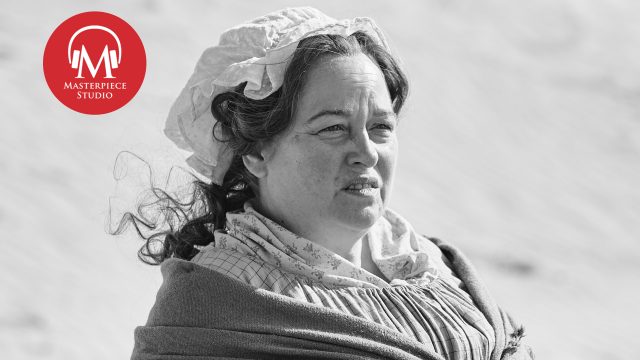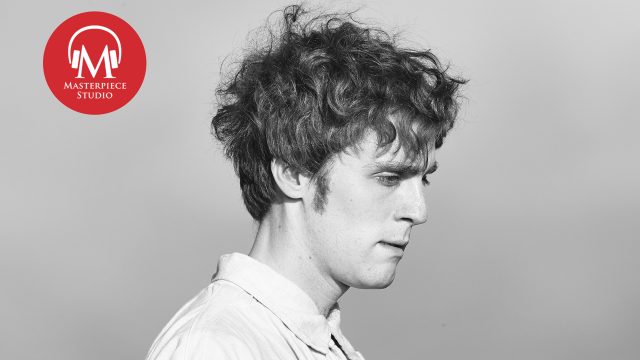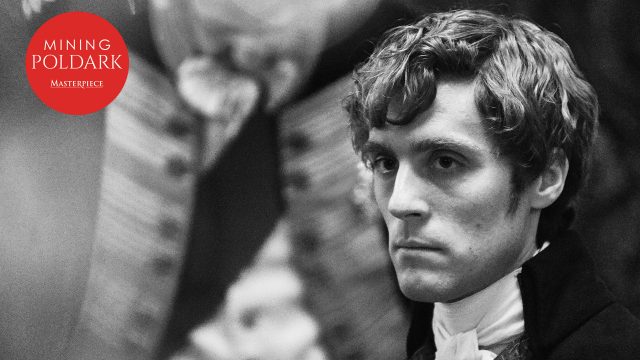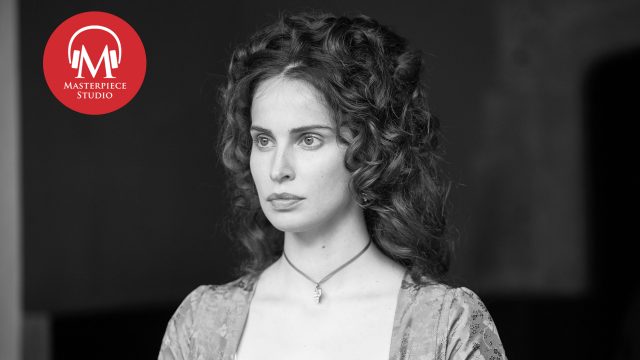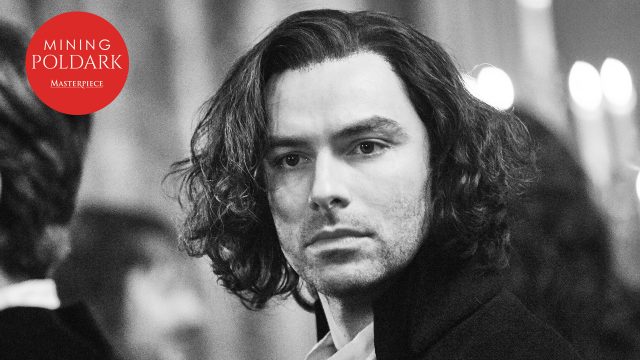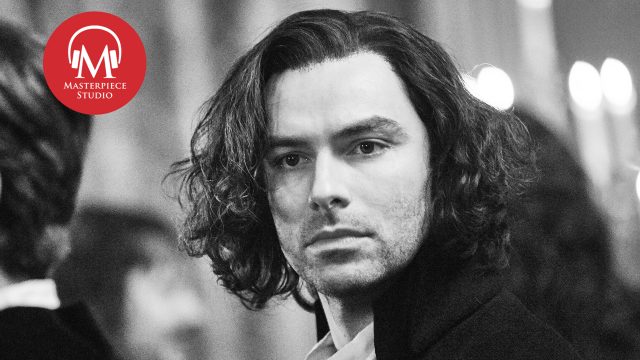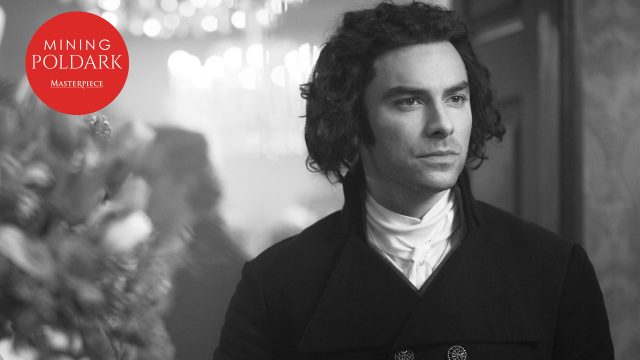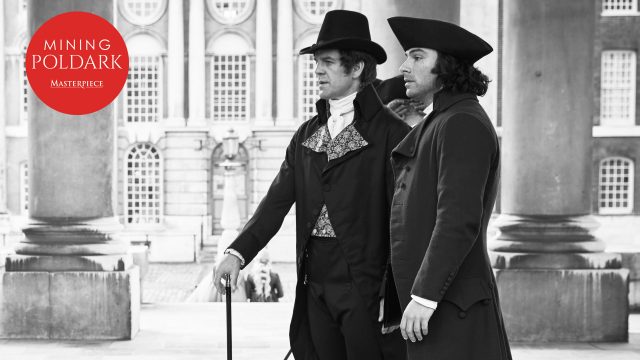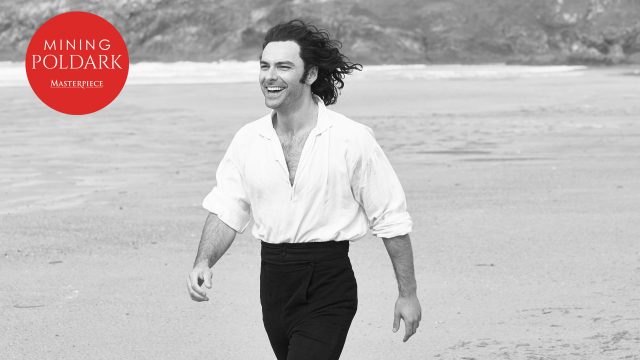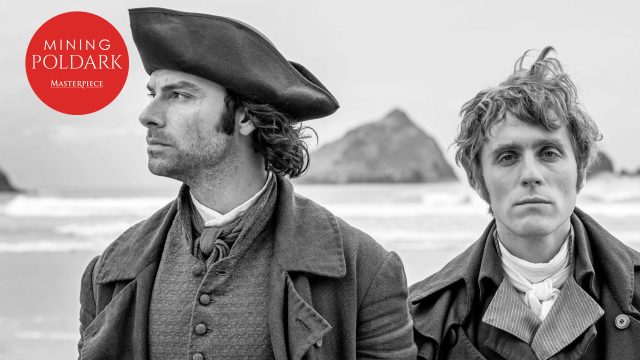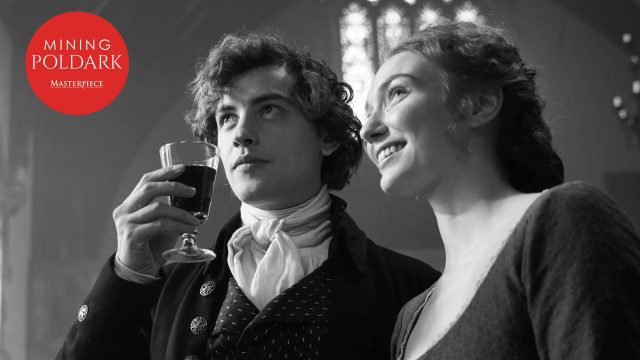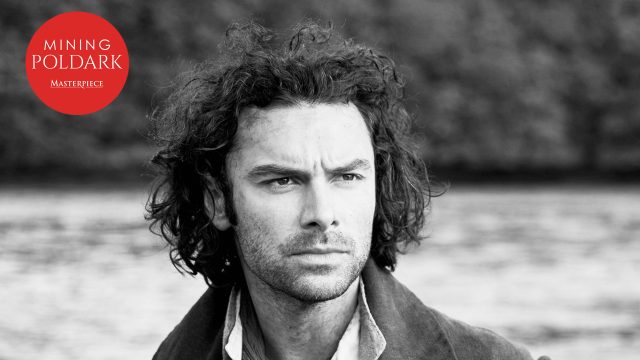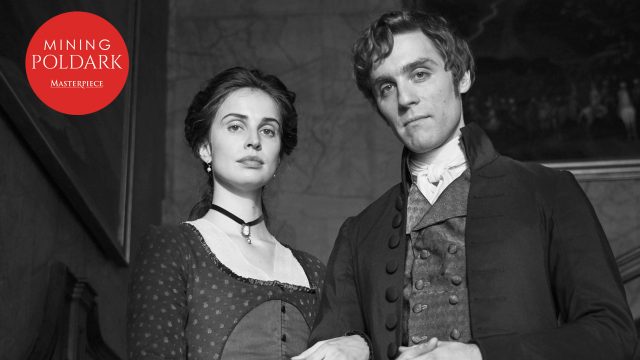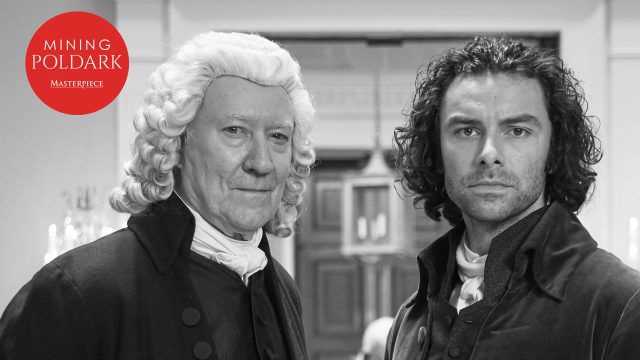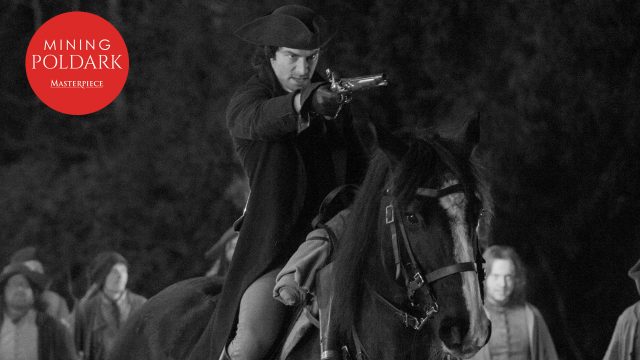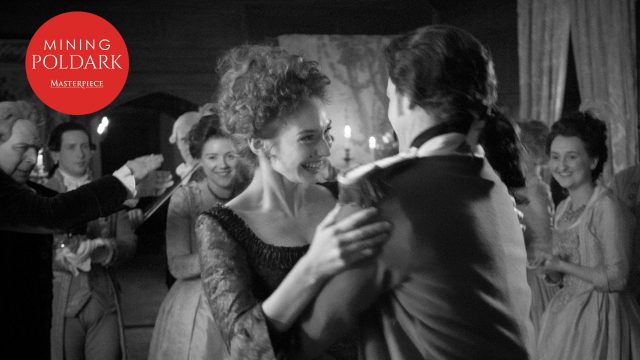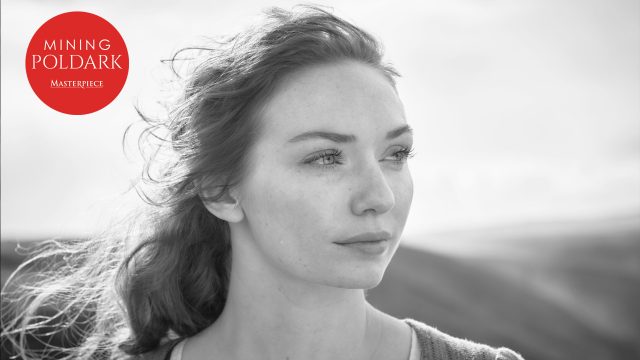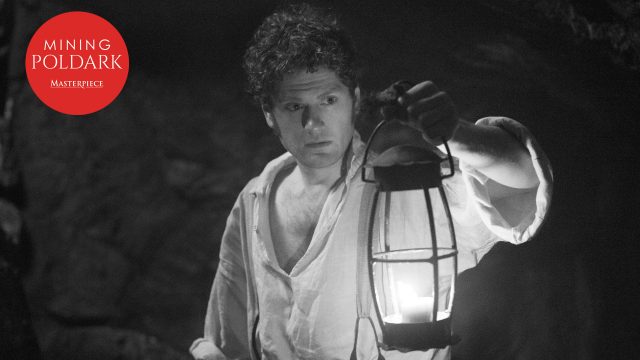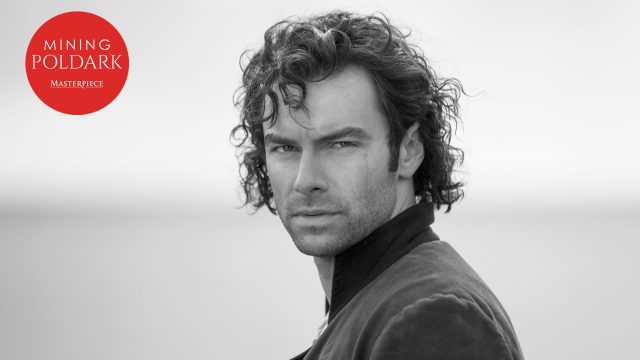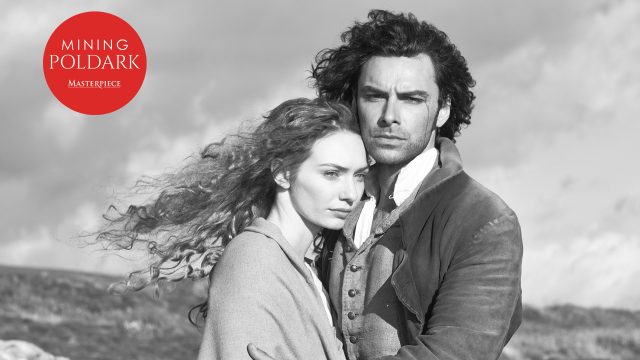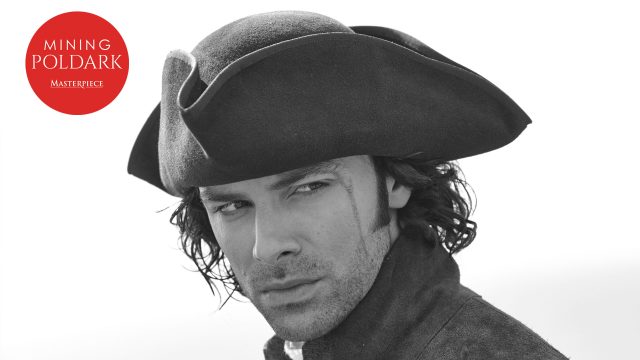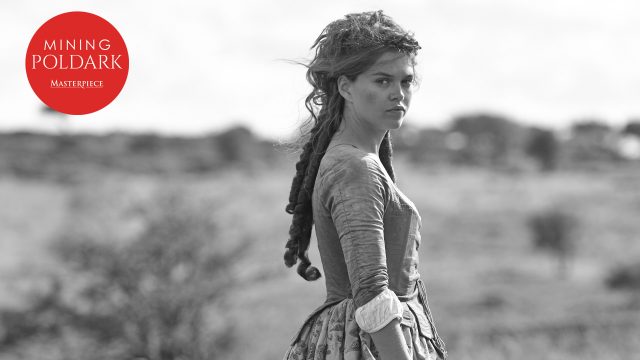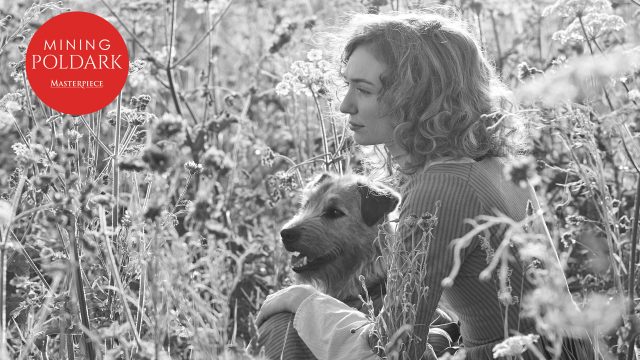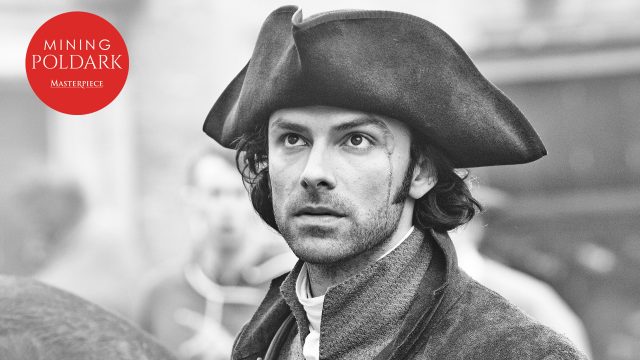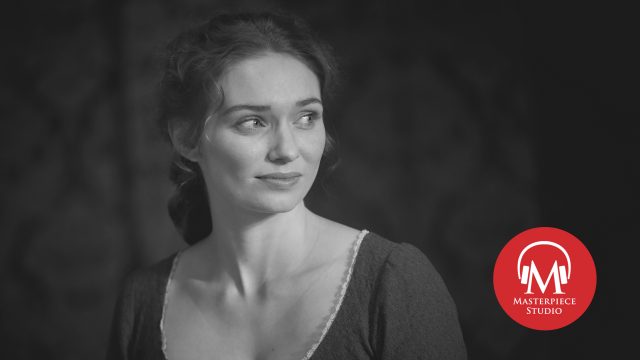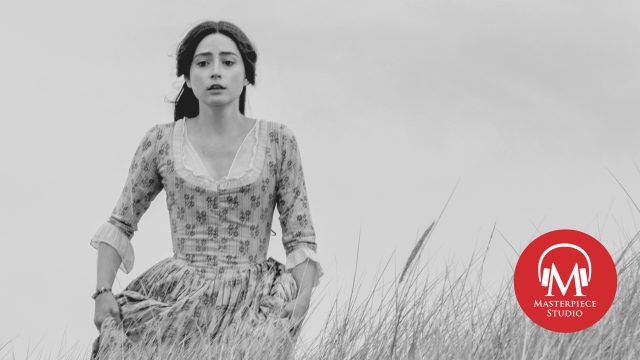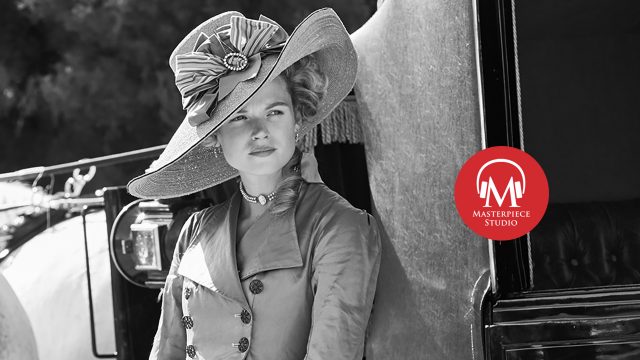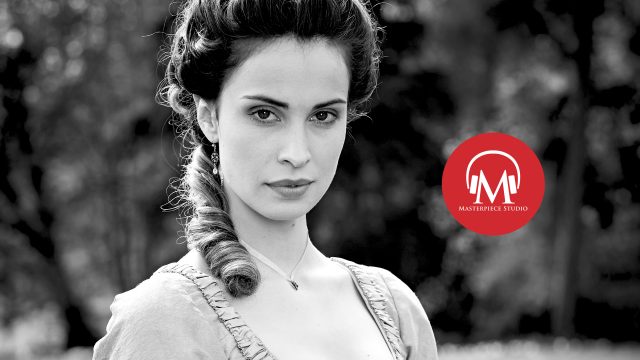Jace Lacob: MASTERPIECE Studio is brought to you by Viking Cruises, exploring the world in comfort. Learn more at vrc.com
I’m Jace Lacob, and you’re listening to MASTERPIECE Studio.
Ross Poldark’s Great Aunt Agatha is a Cornish Greek chorus — lurking in the background by the fireplace, shuffling her tarot cards and always looking for a telling sign from the beyond.
CLIP
Agatha: That child of yours.
George: What of him?
Agatha: Cursed, he be. Born under a black moon. No good shall come to him.
Jace: After a lengthy domestic feud with George Warleggan — whom she sees as an upstart troublemaker of a rather common birth, unwelcome in her family’s ancestral home — Agatha finally revealed her suspicions around Valentine Warleggan’s parentage.
CLIP
Agatha: Little Valentine, the so-called Warleggan heir…or is he? That was no eight month baby George.
Jace: And then, of course, Aunt Agatha dies, two years short of her 100th birthday and alone at Trenwith in a house full of strangers. Actor Caroline Blakiston reflected on her experience with the Poldark cast, her memorable death scene, her nerves on the set of Return of the Jedi — and she even shared a bit of her unmistakable Aunt Agatha accent.
Jace: And this week we are joined by Poldark star, Caroline Blakiston. Welcome.
Caroline Blakiston: Thank you.
Jace: What was your take on the character of Agatha Poldark when you read the scripts for the first season? She’s she’s a bit like a Greek chorus, is she not?
Caroline: When I first started the character was quite a small background character and she didn’t have an awful lot to do but everything she said was very pithy and really they were remarks that went down well with people maybe a one line a lot of one liners she got so people got the idea of her as being a well old and sometimes wise and sometimes rather brutal to the people around her, not caring what people think. She speaks out so that’s usually a sign of a Greek chorus type of thing isn’t it?
Jace: Now over the course of the last three seasons, Agatha as you said has moved much more into the center of the show.
Caroline: Hmm.
Jace: What did you make of writer Debbie Horsfield writing much more for Agatha?
Caroline: Well I could only take it as a compliment that they found the character interesting enough, ‘cause she’s the only really old person in the play. There was nobody near her. She started off I suppose in her 80s and 90s. And at the very end as you will discover from this series, from this episode she was ninety seven and she thought she was going to be a hundred. And then she discovered she’d made a mistake. So she was finished off before she made her century and which was very mortifying for her.
CLIP
George: Born to us, this autumn morn, our first child. A daughter. Agatha Mary. September 14, 1697. So you see, old crone: on Monday, you will be but 98.
Agatha: Tis a lie, a scabby lie!
George: (Laughs)
Jace: We learn in this episode that she she isn’t turning 100 which she’s been crowing about for the last few episodes.
Caroline: Yeah.
Jace: She doesn’t make that century. And why is that revelation quite so cutting for Agatha?
Caroline: Well the young man, George, who is her mortal enemy they’re mortal enemies the whole way through the series and some of the best scenes I had at all were with George, with the wonderful Jack Farthing, marvellous actor, and we really, really enjoyed it. When we finished it all Jack said to me, ‘It has really been a great delight and a privilege to call you hag.’
Jace: Ha ha ha ha.
Caroline: So you know there are things to be got off offset of camera as well the pleasure of it. She’s shy. She was being taken control of by him. She said she was a great family person she believed in in the heritage of her family and being a Poldark and the people who were upstarts and the people who aren’t real Poldark, Poldark, and you know she’s mortified and then when the little Valentine is born and he’s not going to be very strong, born under a black moon and the stars and the cards all say it won’t go well. And she sort of I don’t know you have to believe in people being being psychic. But I think she’s she. She was so old and had nothing to do in her life, frankly, apart from do her cards, read “Tristram Shandy” and eat porridge.
Jace: Is it true that you actually grew out your nails for the role of Agatha?
Caroline: Yes. You bet it is. And I couldn’t make them take any notice of it.
Jace: Now at one point George seems to threaten Agatha with no supper. Do you think he was trying to starve to death or at least starve her into leaving Trenwith for Nampara?
Caroline: Yes. Ah. It never crossed my mind of going to Nampara, I would. I just wouldn’t have done it, I said I’ve lived here. I was born here I’ve lived here all my life and I’ll die here and that is indeed what I do. I think he was trying to starve her out. He never cleaned her chamber pot. The room was horrible and she was cold and they didn’t light a fire in her room. I’m imagining myself back in that chair or cupboard — my rugs and things wrapped around my face to keep me warm and she managed to go on walking she managed to get up the stairs and down I don’t know she had arthritis, or whether somewhere she’d got the secret of everlasting life. She probably didn’t do what I do which is a lot of stretching every day so that I don’t seize up and groan every time I sit down and groan every time I stand up and put one leg in front of the other I’m very keen on staying alive in a well sort of way. I sort of think of myself as an athlete because that helps me keep going helps me stay alive and be able to get down on my hands and knees with the bed. You know the flowerbeds and stuff.
Jace: The scenes between Agatha and George drip with barely concealed venom. How did you and Jack Farthing get amped up to do those rather tense scenes together?
Caroline: Well the thing is you see the actor in the makeup caravan before you start. So you’ve met him in the day earlier and you might even have had a rehearsal with the lines to find out. Because in filming unlike in the theatre you didn’t get time to practice much and as you get older. One of the dread things about the job is having to learn the lines it’s a most cruel thing you can do it but it takes twice as long and you can learn them and know them today and by tomorrow it’s gone. So it’s one of the brutal things about getting older is not being able to remember it. And Jack and I would sometimes practice the words but sometimes it’s quite good just to see each other. He used to come into my room without knocking of course and be there and he has these sort of cold fish look in his eye and you know that things aren’t good he never fired out like at me he was always cool and cold and there’s something really deadly about that it makes your hands sweat with cold sweat. So we would just wait and see what happened. I think by the end after three series and having had quite a lot of scenes together we got used to each other as performers and we knew that whatever the other person would do would be like getting a present. You give a present back of what you can do to make it hard for them.
CLIP
George: There. Will. Be. No. Party.
Agatha: Wait. You do this to me, may you rot in hell, you and your nasty uncle and your little twisted son, born under a black moon and warped already.
Jace: Why do you think it is that Agatha can get under George’s skin in a way that no one else on the show can?
Caroline: Because she despises him because he’s an upstart.
Jace: I love it when you slip into the Cornish accent.
Caroline: I just seeing if I could still do it — he is not a proper Poldark. You see he’s not a Poldark and he’s been, he got into the family and he’s been beastly to Jeffrey Charles, that little boy who’s so wonderful and takes messages and we had a bit with a letter that he had to take and he went running off across the garden. And. I think that Jack knew that I, I could read him. I think he knew I despised him for over-dressing and for being a social climber trying to be grander than he was. Get into silks and satins and I despised that. You will notice that I only had one dress for six years or something which is the only one I had to wear. But I was very happy, I liked it. A costume can become a friend.
Jace: I love that line. A costume can become a friend.
Caroline: Well they can and sometimes if you have a horrible wig that doesn’t quite fit or it hurts or they stick a pin in your head when they pinning it onto your head then a wig can become an enemy. But you get you get to love a character. I loved Aunt Agatha and actually though I didn’t cry on the last day after I’d done my last scene. I did cry when some people came to interview me and they caught me unawares. I think I’d just done a quite an emotional scene and they said, What what will you do when it finishes? And I said, ‘I’ll cry,’ and I really cried, like a two year old. I cry quite easily.
Jace: Agatha is caught in the feud between the Nampara Poldarks and the Warleggans. And she almost seems to relish concealing the truth about Morwena and Drake from George and Elizabeth. Does she do so do you think out of spite for George, or because she can see that the young couple is in love?
Caroline: That’s a good question I think. Anything to do with George will be to do is spite and bringing him down and making him humiliated. There’s that wonderful scene when he went to the party and he wasn’t allowed in and you saw him standing about shamed and undiminished. I think to see him being embarrassed and shamed socially but it was course quite shocking for Aunt Agatha the way poor Elizabeth began to, not be on his side exactly except she sort of had to but she sort of lost that thing of having been a Poldark when she was married to Francis and sort of for a bit I felt a bit of a connection to her and I was always worried that she was making bad mistakes and I was worried that she was still yearning for Ross. I I think that young love more when I found that most painful little affair and the tragedy of that it wasn’t going to work out. Poor little girl. I think I feared for true love. I suppose maybe because I never made it to you know perhaps because I never had that fulfilment I always looked on it with something not of not envy. I don’t think envy. I think tenderness and compassion.
Jace: Worship almost.
Caroline: Maybe. Yeah. It’s there, it’s a beautiful thing.
Jace: Agatha is so angry at George about him cancelling her birthday party that she spills the truth about the parentage of Valentine, saying that was no eight-month baby.
Caroline: No eight-month baby that was no eight month baby George, they have nails nails and stuff. This baby. Anyway. Yes. Well she wasn’t there. For goodness sake. She wasn’t there, but she was in the house. And she will have heard him come into the house and we had a scene which I think was cut to where I was lying in bed and it was me hearing Ross coming up the stairs and knocking on her door to go in. So I think I had probably intuition — she knew she now I think she knew and he looked guilty and she looked guilty.
Jace: And what is she what is she hoping to accomplish by saying this now to George? Is it just sort of the stabbing of the knife in his stomach. Or is it more?
Caroline: What can be more than that?
Jace: It is I think perhaps the cruellest thing that Agatha has done. Not just to sort of get back at George but this does spill out Elizabeth’s secret as well. Does she think about that during that moment?
Caroline: You’re you’re absolutely right. And she also on one level in the story stands for morality. I mean she stands for straight behavior and not telling lies and and standards having the standards that she she was brought up with. And so when she’s discovers that out of her rage and contempt for him and because he is thwarted me — May you rot in hell! You know all that stuff. She really means that because he’s been thwarting her for a long time. And I think she needs him to know. But of course then that is the beginning of her last her little final little epilogue where she goes she collapses the stress of having told this terrible thing to him. She knows she’s won, but in the end I think on your deathbed probably morality may talk and you may feel that wasn’t the right thing to do in the end. In an archetypal morality. At the end of your life probably would prefer to be more kind.
Jace: She doesn’t even recognize Elizabeth by the time Elizabeth finds her.
Caroline: No.
Jace: She just keeps mumbling.
Caroline: Thank you for noticing that. Thank you for noticing that because there I can see her eyes the actress I can see her very clearly. And I understood that. Should I tell you what do you want to know about the death scene? How I did it.
Jace: Yes.
Caroline: Well I had tuberculosis about 10, 15 years ago and I had tuberculosis and I got better took pills and got better and the doctor who got me better I thought when I thought I have to do a death scene I’ve never died. I’ve died in plays and I’ve died in scenes, but I’ve never died yet. So maybe I don’t know what it’s like. So I rang up the doctor and I said, ‘Look can you tell me about dying?’ And he said, ‘Well it’s all in the breathing. Your breathing becomes more shallow. You can’t take such deep breaths. They come higher up in your lungs all the time.’ So you can’t do your sentence. You can do little and you take little short breaths like this they can we can we can at one point when I did take it, ‘Could you just do it a bit louder, Caro?’ and I said ‘No actually I can’t, I’m dying. I can’t do it louder.’ You just have to make, you have to manage. So it just gets less and less and less. And then in the end. You can’t make a sound at all and it’s just your breath goes out. And then of course having done that and the breaths go out then you can’t move. They kept the camera on me after I died. Well he did so much or she did. She did her stuff Elizabeth did all that stuff and during the whole of that I had to not take a breath at all. But hey you know what. It’s quite easy because what you do is you relax and you say I am dead now.
Jace: And that’s it. That’s that’s what you say that to yourself?
Caroline: I say that to myself. And I didn’t do anything at all until they said cut, including breathing.
Jace: I mean it is to me one of the most gut-wrenching death scenes I’ve seen.
Caroline: Oh hey that’s a nice thing to say. Did it make you sad?
Jace: It made me. I got very upset because she seems Agatha seems eternal. Like you.
Caroline: Thank you!
Jace: Just you know she’s always going to be there.
Caroline: I love it.
Jace: And this was this was a reminder of you know that life goes on but life does not go on for all of us. It was it was very very emotional to watch I can imagine actually being there or filming it because it is. She suggests that George not only stole her home away from her, but her sense of hope. It’s just such an upsetting distressing scene.
Caroline: Yeah. Did you believe she was 98, 99, nearly 100?
Jace: Yes. I mean like I said she seems not only makes she will always be there she seems like she has always been there. She has a lot of time, she’s just she’s eternal.
Caroline: Oh that’s wonderful. That’s such a compliment. I just take that with gratitude. It’s wonderful thank you. Makes my job worth doing that sort of remark. I had some really nice messages actually from people saying you know we’re going to miss her.
Jace: Do you think that the circumstances of her death render Agatha as a tragic character?
Caroline: Uh. I don’t I I can’t tell that. I think I don’t know if that is so it depends what happens to the family afterwards. I mean if her dying causes more people to be unhappy she’s not there as a sort of break on the horror. I suppose you could say that. I suppose you could say no I don’t know. I can’t answer that. No I think she was there like a like a tree you know and a tree gets blown over and the leaves fall off and the roots go up in her legs go up in the air and she’s dead. I think it’s okay. She goes does go on then. And then when they were doing the death I thought after the like after when she’s dead I thought I’ll tell you what I’ll do I’ll go down to Cornwall where they do all the filming of all this stuff. I’ll go down there secretly and I’ll jump up I’ll jump up behind that gravestone when they bring when they bring her coffin in to bury her. Then I saw that they weren’t going to bury her at all and it’s just poor Ross has to go and dig, dig a hole. She doesn’t get a burial.
Jace: That would have been amazing, though.
Caroline: He just digs a hole and puts her in it would have been oh it been a riot sort of thing you do you know you just turn up on the set and ‘Hello I’m here, it’s me!’
Jace: Elizabeth is a deeply shaken by Agatha’s death and given her iciness all season — it’s a rare moment of emotion for him as with when he kisses Agatha’s hand. What do you think of Agatha and Elizabeth’s relationship over these three seasons?
Caroline: You know what. I think that she had a very, very, very, very good job doing that part. Heida, I thought she did very well because she’s a know, sort of can be an annoying character, because she’s so sort of, she doesn’t stand up for herself, and she, you know, you want her to be more like Demelza and stand up for herself. But she’s got this weak husband who drinks and so on in it and you think, she gets lots of beautiful frocks and my goodness is she beautiful, that girl from Iceland. And she was she was very subtle. I thought the way she played Elizabeth, moving into this thing about finally really showing her emotion. I think that maybe Aunt Agatha had been perhaps a form of reality that she could perhaps hold on to who she knew was in another part of the house. I don’t think she ever came into my room but I was there in the house and then I’d be there eating my porridge. There was something perhaps vaguely comforting.
Jace: MASTERPIECE Studio is brought to you by by Farmers Insurance and their eighty-eight years of experience helping people so that they can prepare for the unexpected. They know a thing or two because they’ve seen a thing or two. Find an experienced agent at farmers.com
MASTERPIECE Studio is is also brought to you by Viking Curises. See the world differently by exploring differently. Learn more at vrc.com.
Jace: It’s such a rare moment of vulnerability from Agatha when George says her party is cancelled. When is it about that moment, and George in particular that breaks her heart? Cause that’s what it is it does seem like her heart actually breaks.
Caroline: It’s her heart cracks, her heart cracks. And I think Aunt Agatha has had some passion in her life all those young men that she didn’t marry. I think she got around a bit. There was one called Randolph, and I, I remember thinking he’s the one I really loved. And I remember it not it didn’t show on I it may not even been seen on the screen but I certainly know that when I said Randolph I remember thinking my heart went you know went soft.
Jace: Pitter patter. And then Elizabeth says.
Caroline: Yeah.
Jace: They’re all dead.
Caroline: They’re all dead. And I say, What do you mean. Show me the list. Terrible.
Jace: How did you find out that Agatha was going to die in this episode? Did you know that going into this season?
Caroline: Well. I did know that going into the season because they give you the scripts and I knew that I was going to die at the end of that season. Yes I did. I’m glad because it gave me time to learn the lines. The problem of learning all that. That’s stuff that she does all that shouting. You don’t pick that up overnight. That takes time. So I was really glad I had time to get ready for it.
Jace: Did you keep any mementos from the set?
Caroline: Yes. They gave me my tarot cards.
Jace: Oh I love that.
Caroline: They wrapped them up with the silk ribbon and gave them to me — I was looking at them today my tarot cards and they gave me the copy of “Tristram Shandy.” Which is the book I gave to read which was written in I think 1680 just exactly the time when we were doing the program. So I asked could I have “Tristram Shandy.” Nobody would have known that. It’s a marvellous classic story.
Jace: What do you miss most about playing Agatha and Poldark in general?
Caroline: I miss being with the people I miss feeling like what she feels like. I miss feeling that I’ve been in that house you know that we played. I wish I was in the same address the whole time. I never went to Cornwall or when everybody else went to Cornwall to do their filming. I only was ever in that house and in that garden. So I was in Bristol which is not far from London. And it’s the coldest house I’ve ever been to in my life and I would sit there saying can you not do more to make me warm and I would have two or three petticoats and hot water bottles up my skirts down the back all round about in my behind my knees everywhere. Anything to keep me warm. And I miss the camaraderie you know you get to be a family with actors when you when you see each other if you’re all working together for three years which we were. I was and they’re still doing it and they were all there much more than I was because my part was small compared with theirs. You get to love the people you get to love everybody you get to love the camera man and sound man and the prop man and makeup you just get to love it.
Jace: I’d be remiss without asking about Mon Mothma.
Caroline: Go on.
Jace: The heroic leader of the rebel alliance that you played so memorably in Star Wars Return Of The Jedi. At the time. Did you think that the character would still inspire so many people today?
Caroline: Well you know when I went to long to meet them of course I hadn’t seen the first film that that was the third wasn’t it? Jedi was the third of the old of the first set. I think it was. And was it four five six. I can’t remember. I think it was the third one. And so I hadn’t seen the other film I knew of them of course because they were famous and all the rest of it. And I went along and learned this very difficult speech sort of Star Wars jabber. And when I got there they said oh you won’t be saying that you’ll be seeing this instead. So they then offered me something else completely different which was a great strain. Every time I see the film I think. Why don’t you look more frightened? I was absolutely terrified. So Harrison Ford decided he would be kind and come and sit down talk to me because I was looking anxious and a bit nervous. It was a big scene with every single person on the set. All the major characters the Star people. Kenny Baker — I miss him and Carrie, you know people go but they were all wonderful and he came and sat down beside me and you know tried to make me feel comfortable and get over my nerves a bit. He was terrific. He was very nice. They all were. They all were. And then it became what it became and then I didn’t do any conventions for a long long time. Jeremy Bullock who plays….
Jace: Boba Fett.
Caroline: Boba Fett.
Jace: Yes.
Caroline: Jeremy said they were going to America to do things and to do Star Wars things he said we ought to have a woman. And there’s only you and Carrie Fisher in the film. So he started to get me and I started to go a little bit. And of course now that I I’m old and now that they’ve got a new young Mon Mothma who I think looks incredibly like me you know in the shape of her face and all of that. And I thought it would be fun to meet her and have a cup of tea I saw that she was on in a play in London recently and I thought you know you should just go and put a note through the stage door and say to her shall we get our photograph taken out of somebody’s iPhone and spread it about that we’re buddies. But I haven’t done it yet.
Jace: When people see you at conventions you know what are a typical reaction from fans that they realize that you played Mon Mothma?
Caroline: Well there are two things. One is as a big picture of me up on a wall behind me because of course when I’m sitting there I’m an old lady and they look at me and they look up at this picture of Mon Mothma and they look at me and they look up and they look down they look like blah blah blah. And then I got a pile of pictures of me what I used to look like. So I signed those and I am who I am. And they are adorable. People are so nice and I get a lot of fan letters still it’s quite extraordinary that they say that they go on sending and that second generation people saying you know I was such a fan and the stuff she’s at. The thing is she’s she’s a bit iconic Mon Mothma. When they gave me the part and it was you know that one page really half a scene and I just thought I’ve got to do something and believe this, and who am I, how am I going to believe this character who comes down out of a tunnel and says these things — Many Bothans died to bring you this information, the time for our revenge has or whatever it is I say. So I looked up in mythology I didn’t know that George Lucas was keen on mythology. I’ve always been keen on ancient Greek mythology actually. So I looked and looked and looked and find that then I worked it out. Possibly she could be Moon Mother, Moon Mother, Moon Mother. So the moon is a pure beautiful thing and I live by the sea on the south coast and every time the moon comes round once a month I think my God another new moon full moon.
Jace: Now, other than Carrie Fisher. You were one of only three women with speaking roles in the original Star Wars movies. The movies today now feature an array of very impressive female characters Daisy Ridley’s Ray.
Caroline: Yup.
Jace: Felicity Jones’ Jin.
Caroline: Yeah.
Jace: Do you view Mon Mothma as a trailblazer in that respect?
Caroline: I don’t think it’s my place to feel such a thing. I mean I I had the I had the privilege really of playing creating as it were a character that hadn’t been on screen before. And there she is she speaks for herself. I don’t think it’s appropriate really for me to be anything other than the person who did that and aren’t I lucky? I look at it and I think well imagine that? You know it to it in a way according to how you see the job of being in it. I think as you get older you get clearer and more perhaps on one level more confident and less less petrified and you begin to think what am I doing this for I’m doing to get up there and try and be a person who has been written by this author to be that person and say that thing how can I do that to the very best of my belief and my professional experience 65 years of being an actress. So how good work can I be. How can I bring 65 years of practice to this. Seeing so you get a lot from it it never seems a small part doesn’t really seem like a small part. Once you got to that stage because every bit of it becomes important and treasured and valuable to you. And that’s what I feel about Aunt Agatha really every bit of her is mine in a way and and treasured and I don’t want anybody to hurt her or damage. And I’d be horrified if anybody beat her up you know — they can’t, she’s dead — or dug her up, you know. I would be appalled.
Jace: Do you have a favorite scene from Poldark?
Caroline: I have a favorite line, which was off camera, and it was when I was talking about my birthday, and I can’t remember it — For my birthday. I want a new jet choker, a jet choker. A jet choker would be a necklace tight round my neck made out of jet, which is a black stone that you only get on the East Coast in the north of England. It’s rather a wonderful rare natural thing that you find it on the beach a new jet choker And it’s not shown I think it’s not you don’t see me saying it but I think you hear me saying it.
Jace: I did hear you saying that. Yes. Did you always want to be an actor?
Caroline: Oh yes. I can’t remember the time when I didn’t. By the time I was eight there was no question of anything else ever.
Jace: Lastly, What is the strangest place you’ve been recognized?
Caroline: Well I came out of the National Theatre just now and there was a lady sitting on a brick and she bricks eh stand she was sitting on a stone waiting for a cab she said and Well done you too! And I said What do you mean. What do you mean I haven’t got any I don’t. Oh she said she was American. Very gracious as Americans are. And she said well we’ve seen you and I can’t think you’d have to ask do you mean did I see it when I was climbing Everest do you mean did I meet somebody on the way down?
Jace: Yeah. On your way down from Everest.
Caroline: Climbing Yes. For Everest, Yeah. That was odd.
Jace: Well, Caroline thank you so much.
Caroline: I’m happy to have talked to you!
Jace: Coming up next on the podcast, we talk to Daniel Lapaine, romantic lead in this season of The Durrells in Corfu, to hear if his relationship with Louisa might truly go the distance.
CLIP
Daniel Lapaine: They’re all so charismatic and interesting and different that they’re just one of those families that I think people gravitate towards and want to be a part of.
Jace: Be sure to catch our interview with Daniel Lapaine, appearing in your podcast feeds November 12.
While you wait, be sure to subscribe to — and review — the MASTERPIECE Studio podcast on Apple Podcasts, Stitcher or wherever else you listen to podcasts. Reviews help boost the show on the platform so that other MASTERPIECE fans can find our interviews for themselves.
The MASTERPIECE Mediterranean Cruise Sweepstakes is happening NOW through November 20, 2017! Enter daily for a chance to win the Grand Prize, a Viking Cruise for two adults. You may also win 1 of 3 monthly prizes of shopPBS merchandise. Visit pbs.org/sweepstakes for Official Rules, including eligibility restrictions and prize limitations. Void where prohibited. Again, that’s pbs.org/sweepstakes.
MASTERPIECE Studio is hosted by me, Jace Lacob and produced by Nick Andersen. Elisheba Ittoop is our editor. Special thanks to Barrett Brountas. Susanne Simpson is our executive producer. The executive producer of MASTERPIECE is Rebecca Eaton.
Sponsors for MASTERPIECE on PBS are Viking Cruises, Farmers Insurance, and The MASTERPIECE Trust.
CLIP
Caroline: I haven’t got a breath to cry with. I died and I won’t lie down.
Jace: I had no idea you sang.
Caroline: Nor did I.












